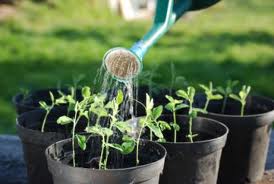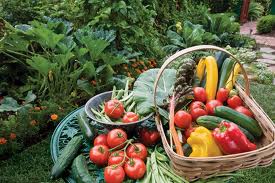Eco Green Facts



 Information On Growing A Better Organic Garden
Information On Growing A Better Organic Garden
 Organic gardening has so many possibilities as to what you can use, do, and how you can apply it to your own personal organic garden. Why not take advantage of having a unique garden and create your own organic gardening techniques that work for you and only you? This article can help you start.
Organic gardening has so many possibilities as to what you can use, do, and how you can apply it to your own personal organic garden. Why not take advantage of having a unique garden and create your own organic gardening techniques that work for you and only you? This article can help you start.
When watering your indoor seeds and seedlings, it is important to keep in mind that how you water is significantly more important than how often. You will only need to water about once a week, but when you do you want to make certain that only the top two to three inches of soil are moist and damp. You also want to be careful not to water too deep because then they will not be able to grow.
If you have an organic garden, you are certain to want a reliable method to deal with slugs. One of the most effective ways to do this is by sprinkling diatomaceous earth around the perimeter of your garden. Most effective when dry, this product dehydrates soft-bodied pests. Be careful not to inhale or get on your skin.
Use soap on your plants. Not much is worse than a bad aphid infestation. Your plants will look terrible, and eventually die, if the bugs continue to work on your plants. To get rid of them now, fill a spray bottle with dish soap and water. Spray thoroughly, and repeat as needed.
To keep air flowing through your compost pile, stand a large PVC pipe with punched holes in the center of your pile so the air flows up and down the pipe, and then through the holes directly into the pile. The air movement helps your soil decomposers create the heat needed to jumpstart the decay process.
Get rid of nematodes such as roundworm or eelworm. These pests can cause malformed plants with stunted, yellowing leaves. In the worst cases, leaves will wilt in a single day and the roots will become infected. The best option is to plant resistant varieties of apple, bean, carrot, celery, cucumber or onion. Otherwise, increase the organic matter in your soil. Compost contains predacious fungi and fatty acids that are toxic to nematodes. Remember to disinfect any tools that you have used in infected soil.
Hand weed your organic garden on a regular basis. Just get on your knees, put your hands in the dirt, and pull weeds out by their roots. If you do this regularly, you can avoid having to use harmful pesticides. Your garden will stay healthy, safe, and organic.
Try using organic matter for your organic garden. The best organic matter that you can use for your garden’s bed preparation is a type of compost that is made from anything that used to be alive. Examples of this would be compost comprised of dead leaves, any kind of kitchen waste, or even grass clippings.
Don’t be alarmed at the amount of organic fertilizer you may need to use. Organic fertilizers contain a lower percentage of nutrients per unit weight than their synthetic counterparts. Because of this, it will probably be necessary to apply more volume of organic fertilizer than is typical for synthetic fertilizers.
If you have a problem with aphids, consider using ladybugs. Ladybugs are natural predators to aphids, and they are very effective in keeping the aphid population under control. You can buy them in bulk from a garden center or online. This is a much better solution than spraying your plants with pesticides.
Do you have weeds in your garden and you don’t want to spray dangerous weed killer? Common household vinegar can help your problem. Spray full-strength vinegar on the weedy spots on a sunny day. Vinegar works as an organic weed killer and it is safe the environment, and you.
Variety makes for a better compost pile. By using a wide variety of materials in your compost pile, you are providing a better pH balance, more nutrients and microbial organisms. Shred materials when possible, as smaller particles decompose much faster, but having a few larger materials in there helps to improve the aeration. For the best results, don’t add any more materials once the composting process has begun. 
To keep dirt from getting stuck in the leaves of lettuce and other leafy vegetables, use mulch. When the plants appear, spread an inch or two of mulch around the base of the plants. This will prevent dirt from getting into the plant and also help prevent pesky weeds. Just be sure that the mulch is organic and untreated by pesticides.
Organic Gardening
An important tip for organic gardening that will naturally help prevent disease from appearing in your plants is to move your plants to different spots of your garden each year. This will keep any disease from spreading because the soil doesn’t build up harmful organisms from planting in the same spot each year.
Composting for organic gardening reduces the need for fertilizers, is a form of herbicide, can help prevent plant diseases and helps impact the environment in positive ways. Composting is a source of nutrition for insects, helps with soil erosion and reduces waste sent to landfills. It is wonderful for the health of the environment in general.
When planting your tomato seedlings in your organic gardening, you should plant them up to the first true leaves, which will bury the stem. The reason is because new roots will sprout on these buried stems. The more roots there are in a seedling, the more fruit it will produce.
If you are interested in sustainable organic gardening consider keeping part of your property undeveloped so that wildlife can flourish there. You will find that many of the supporting cast of insects and birds that aid in plant production and pollination will be present on your land and actually help your developed gardens to produce better.
While organic gardening is a great way to know exactly what is being put into your body you will have to give a little more care in washing and looking over your produce. This is because there are no products used on the produce which can lead to more bruising and pests.
Gardening of any type can be a great hobby that helps you to feel more at one with the earth, but organic gardening is especially good at this. When you do this type of gardening you will start to have a good idea of the whole process of planting from start to finish.
Use compost to feed your crops. In organic gardening compost is necessary for the survival of your plants. A home compost pile is a great, inexpensive source of compost. Many food scraps, grass, and dry leaves can be used in your compost. However, avoid cooked foods, ash, and animal waste in an organic compost pile.
Making your own compost for organic gardening is extremely simple and easy to do. It provides soil of gardens with rich nutrients and keeps soil cool during summer months. You can use kitchen waste, sawdust, aquarium water, coffee grounds, tea leaves, rabbit or hamster droppings, a thin layer of lawn clippings, spices and eggshells in your compost.
A great tip that can help improve your organic gardening is to start reusing rainwater. If you’ve never thought about reusing rainwater before, you’re seriously missing out. All you have to do is place a few barrels under your roof to collect any extra rainwater that will run off.

For indoor organic gardening, temperature control is very important during the early phases. Seventy degrees Fahrenheit is the ideal temperature for most seeds to start growing. You can achieve this temperature relatively easily by installing heaters and placing the seeds near the vents. You can also purchase heat mats to place under your plant containers.
Isn’t creating your own personal organic gardening techniques a lot of fun? As you have seen in this article, there are a lot of ways this can be done and no two techniques will yield the same results. There are also lots of customizable options that can work with your organic garden and budget.

